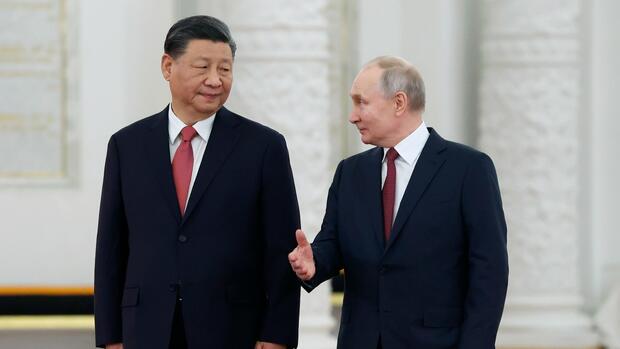Berlin, Brussels There was talk of arbitrariness, of a breach of international law: during the tenure of US President Donald Trump, the Europeans were outraged at threats of “extra-territorial sanctions” against them – i.e. economic penalties that are not aimed directly at an opponent, but at his opponent trading partner.
The EU and the federal government sharply criticized this – and made plans to let US sanctions come to nothing. The EU Commission is now preparing a spectacular policy change, as Brussels diplomats confirm to the Handelsblatt: In the eleventh package of sanctions against Russia, which the EU states are discussing this week, the Commission wants to create a legal basis for punishing Moscow’s trading partners.
For the first time since the beginning of the Ukraine war, Brussels also wants to take action against Chinese companies suspected of supporting the Kremlin’s war machine with technology supplies. Specifically, it is about eight companies against which, according to EU diplomats, “there is very strong evidence”.
These include electronics suppliers such as 3HC Semiconductors and King-Pai Technology. Companies from Syria and Iran are also on the list.
The already tense relations between the EU and China due to the Ukraine war are likely to be additionally burdened by a listing. Chinese President Xi Jinping is one of Kremlin chief Vladimir Putin’s most important partners internationally.
China warns and threatens retaliation
A Chinese foreign ministry spokesman warned Monday that the EU’s planned move would “undermine mutual trust and cooperation with China and deepen division and confrontation in the world.” China calls on the EU “not to take this wrong course”. The spokesman threatened “decisive action” should the EU implement its plans.
China’s support for the Russian government was also an issue at the meeting between Foreign Minister Annalena Baerbock (Greens) and her Chinese counterpart in mid-April. When asked at the press conference, Qin Gang said that China does not and will not supply weapons to “belligerents”. A delivery of so-called dual-use goods, which can also be used for military purposes, is checked according to the legal requirements, according to Qin.
China deliberately gives some companies leeway to continue exporting military goods to Russia.
(Photo: dpa)
This wording gives Chinese companies leeway. As reported by the Wall Street Journal, state-owned Chinese defense companies are said to have supplied navigation devices, jammers and parts for fighter jets to sanctioned Russian defense companies, sometimes through subsidiaries or intermediaries.
The EU Commission is aware that the step to impose sanctions on companies from third countries represents a “significant” change in European foreign trade policy. However, this is “necessary to maintain our sanctions regime,” as a diplomat emphasizes.
The EU has long observed how trade flows are being diverted to circumvent sanctions against Russia. This is why European night vision devices are repeatedly found on fallen Russian soldiers in Ukraine. The EU has concrete evidence that these goods are being delivered to Russia via third countries such as Armenia or Uzbekistan.
More pressure on third countries
The Irish diplomat David O’Sullivan has been EU sanctions officer since last December and is trying to sensitize third countries to the problem of circumventing sanctions in confidential talks. Some countries, such as Turkey, the United Arab Emirates and Kazakhstan, have shown cooperation, EU sources report. Others, such as Armenia and Uzbekistan, less so.
Russian soldiers continue to use European-made goods.
(Photo: Reuters)
That is why the EU now wants to create a legal basis for targeted export bans against third countries. This means that the EU will continue to rely on diplomacy, but expects better chances of asserting its interests if O’Sullivan no longer goes into the talks empty-handed.
>> Read also: G7 countries are moving closer together – and are sending a clear message to China
The idea is to be able to threaten to completely stop exporting chips or night vision devices to a certain country. Initially, however, only the legal basis for this should be created. The Commission does not suggest the listing of certain countries. This would only take place in the second step if the local authorities continued to be uncooperative. The decision would remain with the Member States.
Experts speak of a “paradigm shift” in Brussels. “For years, the EU has built up the narrative that the US’s extraterritorial sanctions are not legally covered,” says Tobias Gehrke of the European Council on Foreign Relations (ECFR) think tank. That is why some governments are hesitant to start doing this in Europe as well.
Strong resistance is expected during the deliberations of the EU ambassadors on the Commission proposal. The Nordic countries, for example, are skeptical about extraterritorial sanctions. In addition, there are traditional critics of sanctions such as Hungary and the shipping countries Greece, Cyprus and Malta. All 27 states must agree to the new sanctions package.
Powerful EU countries are in favor of third-country sanctions
However, in February the Netherlands, for example, called for better enforcement of the sanctions against the Kremlin. “Russian evasion tactics are becoming more numerous and creative,” said a paper from The Hague, which was also signed by 13 other countries, including Germany, France, Italy and Poland.
Even if the member states should now agree to the instrument, there are great doubts as to whether Brussels will ever impose extraterritorial sanctions. “The EU would then have a new instrument up its sleeve,” says sanctions expert Gehrke. “The question is whether she dares to use it.”
That should also depend on the importance of the country concerned. “You can make an example of Armenia,” says Gehrke. “It would be politically difficult with Turkey or China.”
More: How Russia Diverts Its Trade Flows and Outsmarts the West
